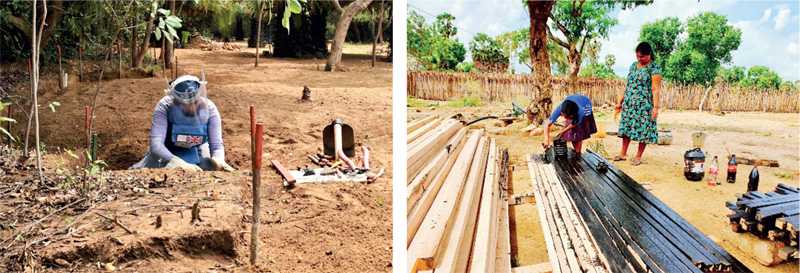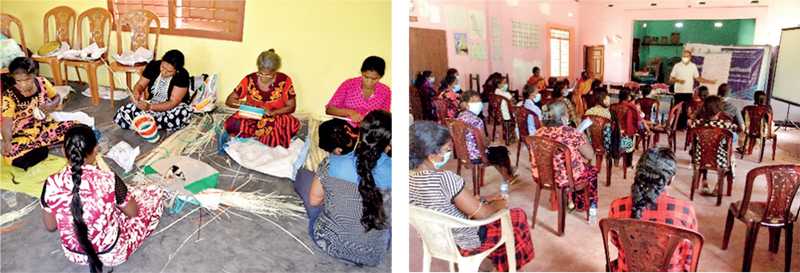Friday Feb 27, 2026
Friday Feb 27, 2026
Friday, 11 December 2020 00:00 - - {{hitsCtrl.values.hits}}

Since 1991, a global campaign has run from 25 November, the International Day for the Elimination of Violence against Women, until 10 December, Human Rights Day. The 16 days of Activism sees individuals and organisations from across the world, unite against sexual and gender-based violence (SGBV).
Together, they demonstrate solidarity with survivors, raise awareness, and support efforts to end violence against women and girls (VAWG). The campaign reminds us how much progress has been made, thanks to the bravery and persistence of many incredible campaigners. But it also highlights how much more work is needed.
The fact that globally one in three women experience SGBV is a familiar, but unacceptable, reality. Sri Lanka’s 2019 Women’s Wellbeing Survey, conducted by the Department of Census and Statistics, sadly found that 24.9% of women have experienced physical and/or sexual violence since the age of 15. During this pandemic year, rates of SGBV have soared worldwide. Communities unfortunately face new levels of economic strain, mental health problems, and confinement in their homes due to isolation measures. Millions of women and girls are enduring more time under the same roof as their abusers. And countless more women and girls have tragically become victims of SGBV for the first time. Now more than ever, this global emergency needs swift, collective and effective action.
Each year, the 16 days are used to rally the world around a different theme. This year the campaign is asking us to, ‘Orange the World: Fund, Respond, Prevent, Collect!’ So, you’re probably asking, what is the United Kingdom doing globally, and in Sri Lanka, to ensure we help #orangetheworld?
Fund: The UK is investing £ 67.5 m into research across the world, on what works in prevention of SGBV. This is the largest investment of any donor government. They hope to scale up proven interventions around the world to tackle the root causes of violence, and pioneer innovative solutions to combat violence in conflict and humanitarian settings. In Sri Lanka, they have put women and girls at the centre of their approach to work on peacebuilding and human rights. They provide funding to The Asia Foundation and several community-based organisations, to work with the Sri Lanka Police (SLP), to improve responses to SGBV, particularly in light of COVID-19.
Through the United Nations and the HALO Trust and Mines Advisory Group, we support conflict-affected women and returnees to overcome economic and social insecurities that exacerbate violence, including through livelihood assistance, enterprise development and demining employment. The UK is proud to contribute to demining efforts, where up to 40% of employees are female, of which many are female heads of households.
Prevent: UK-funded interventions have proved that VAWG is preventable. For example, in the DRC, working with faith leaders and community action groups has more than halved women’s experience of intimate partner violence from 69% to 29%. The UK is also delighted to co-lead the new Generation Equality global Action Coalition on Gender-based violence. They believe that education is critical to stopping violence before it starts. This is why the British High Commission in Colombo (BHC) has contributed towards the distribution of educational materials, trainings and discussions on gender-based violence to raise awareness.
They have supported the construction of temporary shelters for vulnerable returned families, prioritising female-headed households and families with children, in order to provide a secure and healthy living environment, free of risks such as abuse. In October, the BHC hosted a virtual panel discussion on ‘New Barriers to Women in Peacebuilding: Cyber-Sexual and Gender Based Violence, Gendered Disinformation and Hate Speech’ reiterating our support to human rights defenders on the 20th anniversary of the Women, Peace and Security agenda. And, marking the 16 days of Activism, the British Council, hosted a virtual panel discussion titled ‘Unpacking Violence’, drawing on its work in arts and society to create awareness, change perceptions and counter stigma relating to SGBV and VAWG.
Respond: The UK is deploying significant investment to leverage a strong and co-ordinated universal response to the ‘shadow pandemic’ of gender-based violence. Emerging global data shows an increase in calls to domestic violence helplines due to COVID-19, up to fivefold in some countries. Our assistance in Sri Lanka has helped strengthen service providers across six districts. It has also helped provide comprehensive information for survivors and conflict-affected returnees, including on domestic violence helplines, shelters, assistance providers, district referral mechanisms, and relevant legislation.
Their support has also gone towards strengthening wellbeing, providing motivation and confidence building sessions, as well as psychosocial and mentoring sessions for conflict-affected women and youth. Capacity-building support towards media has helped amplify female and marginalised community voices, on the impact of COVID-19 and helped tackle stigma.
Collect: A vital tool for advocacy and awareness continues to be data collection. To effectively combat SGBV, we need to understand it. This is why their assistance in Sri Lanka and abroad also aims to gather data related to SGBV cases and incidents, to share this information with advocacy networks, and help update and integrate response mechanisms with new approaches and emerging issues.
They’ve supported workshops on reporting for returnee women, and case management for the SLP respectively. And in the past, they have supported data collection and research on a range of issues including monitoring online hate speech and disinformation, stigma of conflict-related sexual violence, and discrimination and harassment faced by the LGBTIQ community.
For many of us the issue of gender-based violence may be intensely personal, for others it may feel remote. But the fact is, violence affects women and girls everywhere, at home in the UK and overseas. It has significant and lasting impacts, including on the potential of individuals, families, communities and economies. For this very reason, we can and we must end VAWG, to change the world in to a fairer, more prosperous and safer place.


